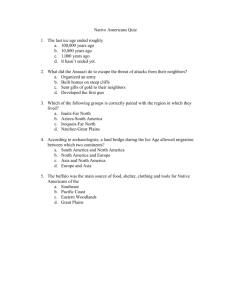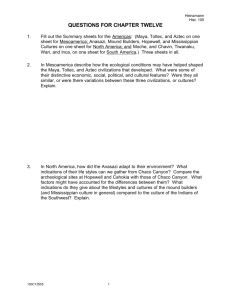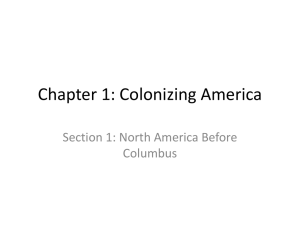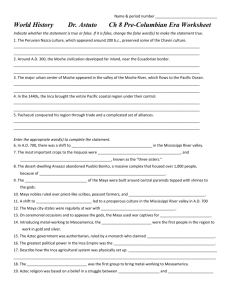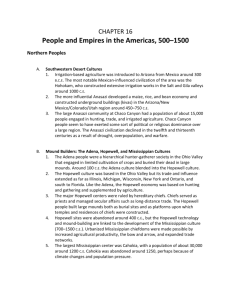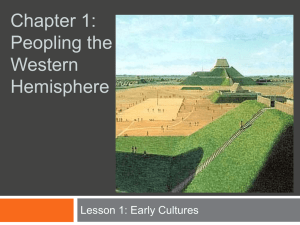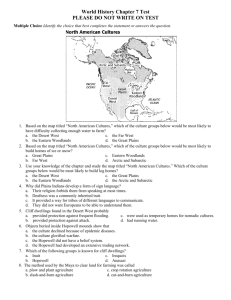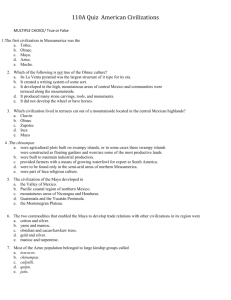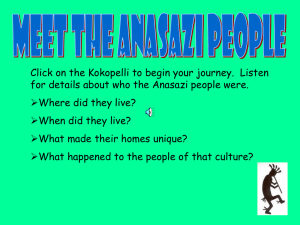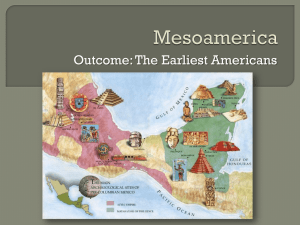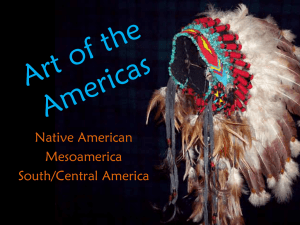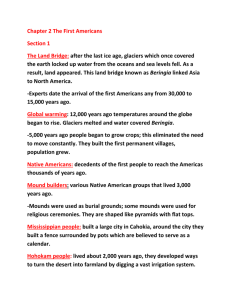Chapter 7 Section 1-3 True/False Indicate whether the statement is
advertisement
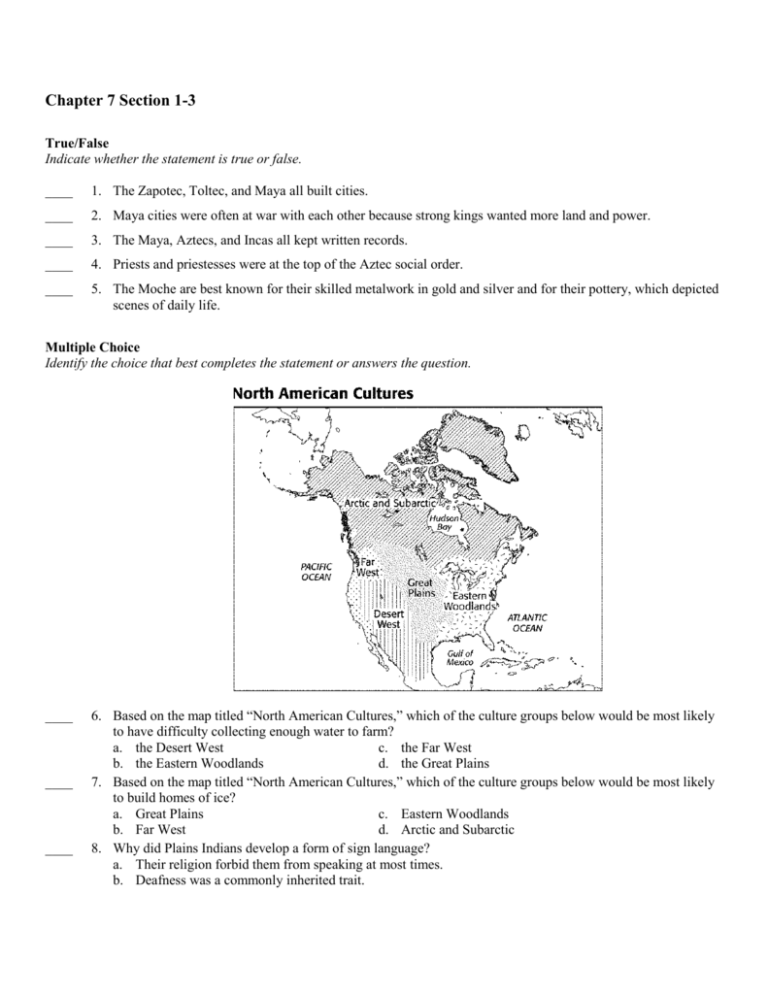
Chapter 7 Section 1-3 True/False Indicate whether the statement is true or false. ____ 1. The Zapotec, Toltec, and Maya all built cities. ____ 2. Maya cities were often at war with each other because strong kings wanted more land and power. ____ 3. The Maya, Aztecs, and Incas all kept written records. ____ 4. Priests and priestesses were at the top of the Aztec social order. ____ 5. The Moche are best known for their skilled metalwork in gold and silver and for their pottery, which depicted scenes of daily life. Multiple Choice Identify the choice that best completes the statement or answers the question. ____ ____ ____ 6. Based on the map titled “North American Cultures,” which of the culture groups below would be most likely to have difficulty collecting enough water to farm? a. the Desert West c. the Far West b. the Eastern Woodlands d. the Great Plains 7. Based on the map titled “North American Cultures,” which of the culture groups below would be most likely to build homes of ice? a. Great Plains c. Eastern Woodlands b. Far West d. Arctic and Subarctic 8. Why did Plains Indians develop a form of sign language? a. Their religion forbid them from speaking at most times. b. Deafness was a commonly inherited trait. ____ 9. ____ 10. ____ 11. ____ 12. ____ 13. ____ 14. ____ 15. ____ 16. c. It provided a way for tribes of different languages to communicate. d. They did not want Europeans to be able to understand them. Cliff dwellings found in the Desert West probably a. provided protection against frequent flooding. b. provided protection against attack. c. were used as temporary homes for nomadic cultures. d. had running water. Objects buried inside Hopewell mounds show that a. the culture declined because of epidemic diseases. b. the culture glorified warfare. c. the Hopewell did not have a belief system. d. the Hopewell had developed an extensive trading network. Which of the following groups is known for cliff dwellings? a. Inuit c. Iroquois b. Hopewell d. Anasazi Which of the following groups was admitted to the Iroquois League in the 1700s? a. Mississippians c. Apache b. Tuscarora d. Inuit Which of the following cultures relied mainly on fishing for food? a. Far West c. Eastern Woodlands b. Desert West d. Great Plains Mesoamerica was the site of the first farming settlements in the Americas because a. Europeans brought seeds and domesticated animals there first. b. people settled there first. c. the groups that lived there were vegetarians. d. the warm temperatures, plentiful rainfall, and fertile soils were ideal for agriculture. Why do scholars believe Olmec people of lower social classes lived outside towns? a. Olmec artifacts are scattered over a large area. b. The towns served as ceremonial, political, and religious centers. c. Archeologists have found residential areas, each with its own large plaza. d. The Olmec kept detailed censuses and had a postal system. What was a major difference between the Maya civilization and other civilizations in Mesoamerica? a. It emerged much earlier than any other civilization. b. It was much larger than the others. c. Unlike other civilizations, its leaders preferred diplomacy over warfare. d. It engaged in trade, while others did not. “All the walls of that shrine were so splashed and caked with blood that they and the floor too were black. Indeed, the whole place stank abominably.” —Bernal Díaz del Castillo, The Conquest of New Spain, 1568 ____ 17. Bernal Díaz del Castillo was most likely describing a temple of which of the following peoples? a. the Iroquois c. the Anasazi b. the Aztecs d. the Olmec ____ 18. Which of the following built the largest empire in South America? a. the Nazca c. the Incas b. the Aztecs d. the Moche ____ 19. Which of the following accurately describes the economy of the Incas? ____ 20. ____ 21. ____ 22. ____ 23. ____ 24. ____ 25. a. government-controlled c. dependent upon slavery b. free market d. weak Cultures of the Desert West included a. the Hopewell and the Mississippian. c. the Mound Builders. b. the Hohokam and the Anasazi. d. the Inuit and the Iroquois. Which of the following provide useful clues about Hopewell society? a. paintings found on the walls of cliff dwellings b. their early written records c. carvings made from walrus tusks d. objects buried inside large stone and earth mounds How did the lives of Plains Indians change after European contact? a. They began to use horses to follow the buffalo herds. b. They stopped traveling in small groups and instead settled in European-style villages. c. They learned European agricultural techniques and began to farm the fertile grassland for the first time. d. They learned how to domesticate animals and became dependent on farm products for food. What did the Zapotec, Toltec, and Maya cultures have in common? a. All practiced human sacrifice. b. All used their strong militaries to dominate a large region for hundreds of years. c. None of the cultures built cities. d. All were in Mesoamerica. The Aztec Empire grew wealthy through a. rich farmland and control of excellent hunting ground. b. rich natural resources. c. tribute and trade. d. the sale of slaves. What led to the downfall of both the Inca Empire and the Aztec Empire? a. the arrival of Spanish explorers b. a massive meteor that caused catastrophic damage c. climate change d. internal warfare between city-states Completion Complete each statement. 26. The Anasazi used underground rooms called _________________________ for meeting places and religious ceremonies. 27. The _________________________ built Monte Albán, the first true city in Mesoamerica. 28. Pueblos, built by the Anasazi, resembled modern apartment buildings. Those built in caves high up on canyon walls are called _______________________. 29. The Nazca created huge designs, including geometric shapes and the outlines of animals, on the _______________________. 30. The Incas used a set of colored and knotted cords called a _______________________ to keep track of the movement of goods throughout the empire. Matching Select the letter of the term, person, or place that matches each description. Some answers will not be used. a. codex i. glyphs b. quipu j. slash-and-burn agriculture c. Mississippians k. maize d. Nazca Lines l. Moche e. mita m. La Venta f. Iroquois n. adobe g. chinampas o. Chavín h. Anasazi ____ ____ ____ ____ ____ ____ ____ ____ ____ ____ 31. 32. 33. 34. 35. 36. 37. 38. 39. 40. Bark-paper book containing written records Mixture of clay and straw used for buildings Mayan symbols representing objects and sounds Used for record keeping by the Incas Built some of the earliest cities in the Eastern Woodlands in North America A tax paid in labor by common people in the Inca Empire Method used by the Maya to clear land for farming Best known for their metalwork and pottery Built pueblos, kivas, and cliff dwellings Early Peruvian civilization
